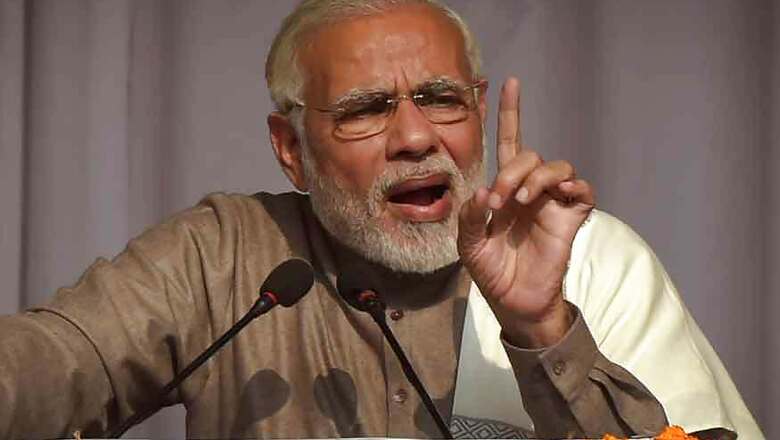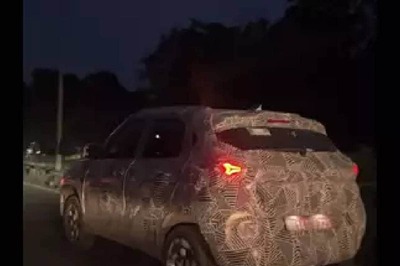
views
Lucknow: A journey that began in 2014 from the land of ‘moksha’ (Varanasi) seems to have taken a new turn with Prime Minister Narendra Modi all set to sound BJP’s poll bugle from Maghar, an eastern UP town known as ‘gateway to hell’.
While Chief Minister Yogi Adityanath and Union Minister Uma Bharti have joined the chorus for building Ram Temple in Ayodhya before the general elections, PM Modi seems to be focusing on ‘development for all’. In fact, his recent 'Mann ki Baat' was a teaser to it.
Invoking 15th century mystic poet and saint Kabir in his speech, the PM said that Kabir appealed to “people to rise above divisions of religion and caste and make knowledge and wisdom the sole basis of recognition".
Many questioned PM Modi’s “sudden love" for Kabir, but the answer lies in his visit to the nondescript UP town on Thursday.
Prime Minister's decision may perturb a few upper caste people, who are believed to be BJP’s main votebank in the state, however, the move is well thought out, especially after the bypoll debacle.
Situated in Sant Kabir Nagar district, close to Gorakhpur, Maghar stands as an antithesis to Varanasi with respect to religious beliefs.
‘Maghar against Varanasi’ indicates the conflict of ideas as represented by Kabir Das versus the upper caste dominated Brahminical Hindu religion.
The poet chose to breathe his last in Maghar because he wanted to fight against the belief propagated by Brahmins that dying in this town leads a person to hell, while ‘moksha’ can be attained only in Varanasi.
Revered equally by both Hindus and Muslims, Maghar has a masusoleum and a samadhi sthal dedicated to the 15th century poet.
Historically, followers of Kabir, popularly known as 'Kabir Panthis', have come mostly from the Dalit and backward Hindu castes, with their maximum concentration in eastern Uttar Pradesh, mainly from Varanasi to Gorakhpur.
Since it’s popularly believed that Kabir's father was a Muslim weaver, he also has a strong following among the Muslims, especially those comprising the poor working class like ‘Julahas’.
With this large appeal and influence base cutting across castes and religions, Kabir can automatically be a strong symbol of politics among the poor and downtrodden, who have traditionally supported parties like BSP and SP.
For BJP, Kabir could be that one harbinger of change in the current political scenario, when it stands perplexed with rising odds in the state, which alone sends 80 MPs to Lok Sabha.
Over the months challenge has only mounted for the BJP with rising discontent among the Dalits and their perceived alienation from the saffron party.
Defeats in the crucial bypolls in Gorakhpur, Phulpur and Kairana Lok Sabha seats, following the coming together of the Bahujan Samaj party (BSP) and the Samajwadi party (SP), has been seen as a new found unity between the Dalits and the backwards.
Many critics believe that BJP, at the moment, is with no clear strategy against these odds. Hence, Kabir can be a possible means of regaining the lost confidence.
With Prime Minister Narendra Modi’s charismatic appeal, his homage to Kabir at his mausoleum, followed by a public rally in Maghar could have a huge political significance.
BJP, however, denies any politics around Kabir. Party's state general secretary and MLC Vijay Bahadur Pathak said, “For us, Kabir Das is not about politics but belief. Our party and government has always cherished his vision. Kabir fought for the downtrodden and the exploited and so is the BJP, which is committed to sabka saath sabka vikas."
He further said that when PM speaks from the dais in Maghar it will further strengthen our resolve to “bring justice to the last man of the society".
Meanwhile, Congress spokesperson and former MLA Akhilesh Pratap Singh said, “Kabir stood against hypocrisy and PM’s hypocrisy will be exposed in Maghar. People will not be fooled by such gimmicks."



















Comments
0 comment